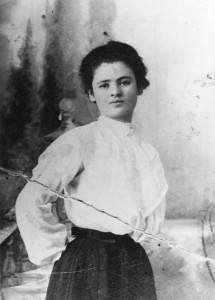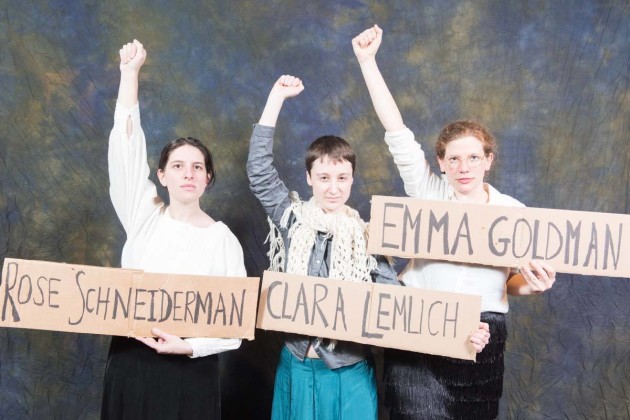
by Haley Kossek
Dear Chelsea Clinton: Clara Lemlich was a Communist—and a Jew

Clara Lemlich c. 1910
This summer, former first daughter Chelsea Clinton released her new children’s book, She Persisted: 13 American Women Who Changed the World. In it, she profiles, among others, the Jewish labor organizer and Communist Party activist Clara Lemlich with these words: “After her family fled poverty and the threat of violence in Ukraine for a new home in New York City, Clara Lemlich got a new job working in a garment factory. She wrote that the factory’s conditions made women into machines, and so she persisted, organizing picket lines and strikes that ultimately helped win better pay, shorter hours, and safer working conditions for thousands of workers—both women and men.”
I wrote this open letter in response.
Dear Chelsea Clinton,
I write to inform you that Clara Lemlich—leader of the Uprising of 20,000 garment workers in 1909, queen of my heart, featured in your new children’s book—was a Communist and a Jew.
She did not flee generic “poverty and the threat of violence in Ukraine,” as you write; she fled an anti-Semitic pogrom in which 47 Jews were killed, 592 were injured, and 700 Jewish families’ homes were destroyed. Later Clara would become a union leader of thousands of immigrant Jewish factory girls in New York City whose lives and work experiences were intimately defined by the same anti-Semitic violence that she had survived. Her famous speech rousing those young women to strike, quoted in your book, was delivered in Yiddish, not English. Little girls reading your book deserve to know this history, which you neglect to mention: Clara Lemlich was a Jew.
Clara Lemlich also was very, very communist. She started sneaking copies of illicit anti-capitalist literature as a child in Ukraine and was already a dedicated Marxist revolutionary by the time she came to the U.S. at age 17. As she led her factory co-workers in forming their own local of the International Ladies’ Garment Workers Union (ILGWU), despite the objections of its conservative male leadership, she was arrested by the cops 17 times. She led three strikes in the lead-up to the famous Uprising that were, in her words, “broken by the police and gangsters hired by the bosses.” Hired thugs followed her home from a picket line in September 1909 to break her ribs and leave her bleeding in the street. After the famous strike, she was blacklisted from both the garment industry and the ILGWU for her radicalism. Later she went to work for a women’s suffrage organization to mobilize working-class women to win the vote… where she also got kicked out for being a Communist.
In fact, the only political organization from which Clara Lemlich was never banished was the Communist Party and its front groups, where she made her political home for the next several decades organizing working-class housewives. She protested the executions of the Rosenbergs in 1953 and the U.S. military intervention in Guatemala in 1954 against a popularly elected leftist leader who supported redistribution of land to poor peasants. (Some members of your family, Chelsea, might know something about this history of U.S.-backed coups in Central America.) Under McCarthy, she was summoned before the House Un-American Activities Committee and her family was investigated and put under government surveillance for the rest of her life.
Far from a warm-and-fuzzy story about a plucky, non-ideological girl who was spontaneously moved to strike to win better treatment for “both women and men,” Clara Lemlich’s story is about militant confrontation with the forces of state and capitalist power that sought to violently repress her efforts toward workers’ power at every turn. Movements to win things like “better pay, shorter hours, and safer working conditions”—along with civil rights and women’s freedom—have always counted radicals like her among their ranks. When history books describe the 1912 Bread and Roses Strike in Lawrence, Massachusetts as a spontaneous outburst of worker frustration—not the product of years of deep organizing by members of the Industrial Workers of the World—and when children’s books in the same vein as yours depict Rosa Parks’s famous act of defiance as a product of tired feet, not a deliberate act of civil disobedience by a long-time organizer who faced economic repression and death threats for the rest of her life—these revisions matter.
In contrast to Clara Lemlich, you, Chelsea Clinton, have spent your life being paid to glide from one patronage job to the next. You have floated on a nepotistic cloud from consulting gigs to board positions at McKinsey, IAC, the Clinton Foundation, and Expedia. In 2011 you snagged a “special correspondent” position on NBC and were paid $600,000 for producing 23 minutes of aired content, a sweet $26,724 per minute. You live in an apartment that costs $10.5 million and your millionaire parents have tax-sheltered your inheritance. (Thanks to Matt Bruenig in Jacobin for compiling a lifetime of patronage here.) I don’t know if you knew that Clara Lemlich was a communist whose life was dedicated to the abolition of the owning class you represent when you chose her for the book, but it seems relevant that you should know.
I hope that every girl in the world gets the chance to be inspired by Clara Lemlich. Her legacy might inspire young women to organize strikes in the garment sweatshops created by your parents’ free trade zones in Haiti, to work against U.S. empire through groups like the Stop the War Coalition that you protested against while at Oxford, or to become card-carrying communists committed to the end of class society. When we do, I can only imagine that we will be warned. We will be given an explanation. And nevertheless, we will persist.
May our foremothers’ memory be a blessing that inspires us to rise towards revolution,
–Haley, Portrayer of Clara Lemlich in the Boston Workers’ Circle Purim Spiel, year 5777

Haley Kossek, center, as Clara Lemlich. Photo credit: Derek Kouyoumijan
Haley Kossek is a labor organizer and member of the Workers’ Circle for Jewish Culture and Social Justice in Boston, Massachusetts.
The views and opinions expressed in this article are the author’s own and do not necessarily reflect those of Lilith Magazine.